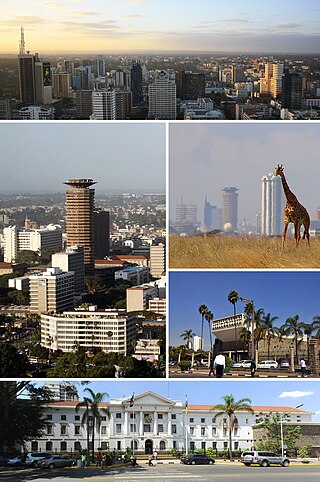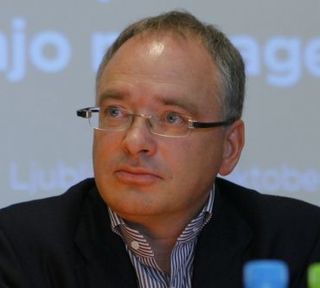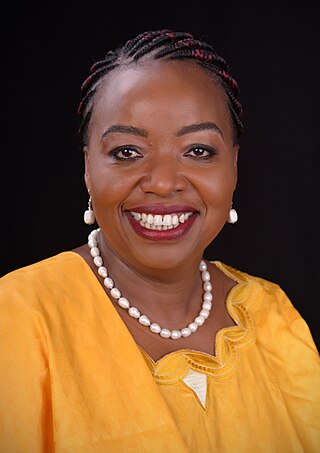Related Research Articles

Kenya maintains relations with various countries around the world. Its closest ties are with its fellow Swahili-speaking neighbors in the African Great Lakes region. Swahili speaking neighbours mainly include countries in the East African Community such as Burundi, the DRC, Rwanda, South Sudan, Tanzania and Uganda.

Nairobi is the capital and largest city of Kenya. The name is derived from the Maasai phrase Enkare Nairobi, which translates to 'place of cool waters', a reference to the Nairobi River which flows through the city. The city proper had a population of 4,397,073 in the 2019 census. The city is commonly referred to as The Green City in the Sun.

The Kenya African National Union (KANU) is a Kenyan political party that ruled for nearly 40 years after Kenya's independence from British colonial rule in 1963 until its electoral loss in 2002. It was known as Kenya African Union (KAU) from 1944 but due to pressure from the colonial government, KAU changed its name to Kenya African Study Union (KASU) mainly because all political parties were banned in 1939 following the start of the Second World War. In 1946 KASU rebranded itself into KAU following the resignation of Harry Thuku as president due to internal differences between the moderates who wanted peaceful negotiations and the militants who wanted to use force, the latter forming the Aanake a forty, which later became the Mau Mau. His post was then occupied by James Gichuru, who stepped down for Jomo Kenyatta in 1947 as president of KAU. The KAU was banned by the colonial government from 1952 to 1960. It was re-established by James Gichuru in 1960 and renamed KANU on 14 May 1960 after a merger with Tom Mboya's Kenya Independence Movement.

Uhuru Muigai Kenyatta is a Kenyan politician who served as the fourth president of Kenya from 2013 to 2022. The son of Jomo Kenyatta, Kenya's first president, he previously served as Deputy Prime Minister from 2008 to 2013.

Thomas Joseph Odhiambo Mboya was a Kenyan trade unionist, educator, Pan-Africanist, author, independence activist, and statesman. He was one of the founding fathers of the Republic of Kenya. He led the negotiations for independence at the Lancaster House Conferences and was instrumental in the formation of Kenya's independence party – the Kenya African National Union (KANU) – where he served as its first Secretary-General. He laid the foundation for Kenya's capitalist and mixed economy policies at the height of the Cold War and set up several of the country's key labour institutions. Mboya was Minister for Economic Planning and Development when he was assassinated.

Kenyatta University (KU) is a public research university with its main campus in Nairobi, Kenya. It acquired the status of university in 1985, being the third university after University of Nairobi (1970) and Moi University (1984). As of October 2014, it was one of 23 public universities in the country.

Corruption in the government of Kenya has a history which spans the era of the founding president Jomo Kenyatta, to Daniel arap Moi's KANU, Mwai Kibaki's PNU governments. President Uhuru Kenyatta's Jubilee Party government, and the current William Ruto's Kenya Kwanza administration has also been riddled with massive cases of graft, topping in the list of corrupt Presidents in Africa
Egerton University is a public university in Kenya. It is the oldest institution of higher education in Kenya.

Bethwell Allan Ogot is a Kenyan historian and eminent African scholar who specialises in African history, research methods and theory. One of his works starts by saying that "to tell the story of a past so as to portray an inevitable destiny is, for humankind, a need as universal as tool-making. To that extent, we may say that a human being is, by nature, historicus.
John William Arthur was a medical missionary and Church of Scotland minister who served in British East Africa (Kenya) from 1907 to 1937. He was known simply as Doctor Arthur to generations of Africans.

Alberta Arnolda "Betteke" van Ruler is emeritus Professor of Communication Science at the University of Amsterdam.

Dejan Verčič is a communication researcher and public relations theorist.

Kenya Civil Aviation Authority (KCAA) is a state corporation of Kenya that is responsible for regulating the aviation industry in Kenya and for providing air navigation services in the Kenya flight region.

Newspapers published in Nigeria have a strong tradition of the principle of "publish and be damned" that dates back to the colonial era when founding fathers of the Nigerian press such as Nnamdi Azikiwe, Ernest Ikoli, Obafemi Awolowo and Lateef Jakande used their papers to fight for independence.
Orders, decorations, and medals of Kenya are awarded by the President of Kenya "in recognition of outstanding or distinguished services rendered to the nation in various capacities and responsibilities". Awards are made by the president upon the advice of a National Honours and Awards Committee in the president's office. Individuals are nominated for awards by district committees, government ministries, religious organisations, non-governmental organisations, individuals and others. The Chief of the Order of the Golden Heart is the highest honour awarded by the Kenyan government.
The following is a timeline of the history of the city of Nairobi, Kenya.

India–Kenya relations are bilateral diplomatic relations between the Republic of India and the Republic of Kenya.
LGBT history in Kenya has been characterized by religious and colonial influences. Interactions with traders along the Indian Oceanic coastline introduced Islamic religious doctrine against homosexuality. European explorers and British colonial rule incorporated the influence of Christianity. After gaining independence in 1963, the Kenyan government has remained hostile to the LGBT community. But in the 21st century, LGBT organizations advocacy organizations have formed.

Esther Koimett, is a Kenyan public-servant experienced in investment promotion, banking, privatisation, public enterprise and public policy. She is presently the Principal Secretary State Department Of Broadcasting And Telecommunication, Ministry of ICT, Innovation and Youth Affairs following her appointment by former president Uhuru Kenyatta in January 2020 . Prior to her appointment in the ICT docket, Esther served as the Principal Secretary, State Department for Transport, Ministry of Transport, Infrastructure,Housing, Urban Development & Public Works since her appointment in August, 2018.

Monica Kathina Juma is a Kenyan diplomat who currently serves as National Security Advisor to President William Ruto. She previously served as the Cabinet Secretary for Defence in the cabinet of President Uhuru Kenyatta.
References
- ↑ A Guide to the Contents of the, Kenya National Archives and Documentation Service. pp. Part 1, p. 1 to 22.
- ↑ Kenya News Agency: Products and Services
- ↑ Gadsden, Fay (1986-01-01). "Wartime Propaganda in Kenya: The Kenya Information Office, 1939-1945". The International Journal of African Historical Studies. 19 (3): 401–420. doi:10.2307/218973. JSTOR 218973.
- ↑ Sriramesh, Krishnamurthy; Vercic, Dejan (2009-01-13). The Global Public Relations Handbook, Revised and Expanded Edition: Theory, Research, and Practice. Routledge. ISBN 9781135845544.
- ↑ Office, Colonial (1955-01-01). Report on the Colony and Protectorate of Kenya for the Year 1954 (1st. ed.). Colonial Office.
- ↑ Sriramesh, Krishnamurthy; Vercic, Dejan (2009-01-13). The Global Public Relations Handbook, Revised and Expanded Edition: Theory, Research, and Practice. Routledge. ISBN 9781135845544.
- ↑ "A guide to the contents of the Kenya National Archives & Documentation Service in SearchWorks". searchworks.stanford.edu. Retrieved 2015-12-08.
- ↑ Kalu, Onuka (1989). Modern Journalism in Africa: A Newspaperman Looks at His Profession. Kalsam West Africa.
- ↑ "More Than Half A Million Images From The Kenya News Agency's Archives Are Now Available Online". iAfrikan. 2016-11-10. Retrieved 2017-11-21.
- ↑ RURAL PRESS/PUBLICATIONS